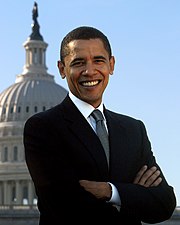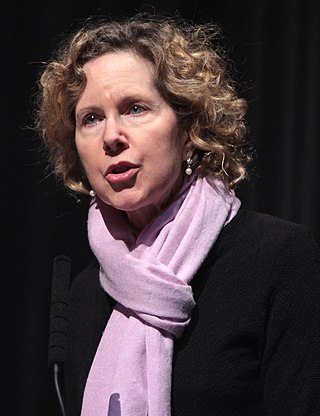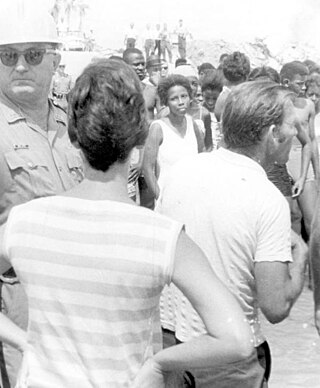This article needs to be updated.(June 2020) |
Post-racial United States is a theoretical environment in which the United States is free from racial preference, discrimination, and prejudice.
This article needs to be updated.(June 2020) |
Post-racial United States is a theoretical environment in which the United States is free from racial preference, discrimination, and prejudice.
One of the earliest uses of the term "post-racial" to describe the United States was in an October 5, 1971, article in The New York Times titled "Compact Set Up for 'Post-Racial' South". [1] The article reported the establishment of a "Southern Growth Policies Board" in Durham, North Carolina, "by some 70 politicians and professors who believe their region of 60 million citizens has entered an era in which race relations are soon to be replaced as a major concern by population increase, industrial development, and economic fluctuations". [1]

Some Americans saw the presidential candidacy of Barack Obama, and his election in 2008 as the first black president of the United States, as a sign that the nation had, in fact, become post-racial. [2] [3] The conservative radio host Lou Dobbs, for example, said in November 2009, "We are now in a 21st-century post-partisan, post-racial society." [4] Two months later, Chris Matthews, an MSNBC host, said of President Obama, "He is post-racial by all appearances. You know, I forgot he was black tonight for an hour." [5]
However, public opinion on whether the United States is post-racial is itself divided starkly by race. In a Washington Post/ABC News poll conducted in December 2014, about 50% of white respondents said they believed that the justice system treats Americans of all races equally, but only 10% of African-Americans said the same. [6] In the spring of 2015, according to a Gallup poll, 13% of black Americans surveyed identified race relations as the most important problem the United States faces, compared with 4% of white Americans. [7]
Arguments that the United States is not post-racial frequently emphasize the treatment of African-Americans and other racial minorities in the criminal justice system and in interactions with the police. Killings of unarmed African-Americans, often by police officers, have been widely publicized. In 2015, according to a study by The Guardian , police officers in the United States killed 7.13 black Americans per million, compared with 2.91 white Americans per million. [8] Additionally:
Young black men were nine times more likely than other Americans to be killed by police officers in 2015, according to the findings of a Guardian study that recorded a final tally of 1,134 deaths at the hands of law enforcement officers this year. Despite making up only 2% of the total US population, African American males between the ages of 15 and 34 comprised more than 15% of all deaths logged this year by an ongoing investigation into the use of deadly force by police. Their rate of police-involved deaths was five times higher than for white men of the same age. [9]
Such killings had a marked effect on public perceptions of race relations in America. The 13 percent of black Americans who called race relations the most pressing problem in the United States in the spring 2015 Gallup poll dwarfed the 3 percent that Gallup reported at the beginning of 2014. [7] And the percentage of white Americans who said race relations were the most important issue rose to 4 percent in 2015 from 1 percent in 2014. [7]
In response to high-profile incidents such as the fatal shootings of Michael Brown, Aiyana Jones, Trayvon Martin, Laquan McDonald, Tamir Rice, and Walter Scott, and the death of Freddie Gray from a spinal-cord injury sustained in police custody, academics [3] and journalists [10] have denounced claims that America is post-racial. Ta-Nehisi Coates wrote in The Atlantic in 2015 that the phrase "post-racial" was "usually employed by talk-show hosts and news anchors looking to measure progress in the Obama era." [10] And Anna Holmes wrote in The New York Times, "Chattel slavery and the legacies it left behind continue to shape American society. Sometimes it seems as if the desire for a 'post-racial' America is an attempt by white people to liberate themselves from the burden of having to deal with that legacy." [11]

However, others argue that post-racial politics champions aggressive action to deliver economic opportunity and weed out police misconduct, without the divisive framing of racial identity. The divide in public opinion on the status of race in America was reflected in reactions to the Black Lives Matter movement. In response to the "black lives matter" rallying cry, some people, including politicians, began using the phrase "all lives matter". [12] [13] [14] In August 2015, after a sheriff's deputy in Harris County, Texas, was fatally shot while pumping gas, [15] Sheriff Ron Hickman claimed that the rhetoric of Black Lives Matter activists had contributed to the killing and said, "We've heard 'black lives matter'. All lives matter. Well, cops' lives matter, too. So why don't we just drop the qualifier and just say 'lives matter', and take that to the bank.' [16]

Supporters of the Black Lives Matter movement criticized the "all lives matter" phrase, arguing that it minimized the systemic threats faced by African-Americans. [17] [18] [19] President Obama said in October, "There is a specific problem that is happening in the African-American community that's not happening in other communities." [20] Andrew Rosenthal wrote, similarly, in The New York Times, "The point of 'Black Lives Matter' is that the lives of African-Americans have come under special and deadly threat since before the birth of this country." [21]
Evidence of continued racial divisions in the United States can also be found in demographics. For instance, African-Americans account for less than 15 percent of the total population of Michigan, but more than 82 percent of the population of the state's largest city, Detroit [22] — and Detroit, like many cities whose residents are predominantly black, has "resegregated schools, dwindling tax bases and decaying public services". [23]
There is a similar dynamic in Louisiana; the state was about 64 percent white as of the 2010 Census, [24] but its largest city, New Orleans, is 60 percent black. [25] Further segregation can be found within New Orleans: the Lower Ninth Ward, for example, is 97 percent black. [26] This was the neighborhood that experienced the most catastrophic flooding after Hurricane Katrina, and the government's response to the disaster has been cited as evidence of the continued presence of racism in the United States. [27] [28] Most of the victims were black and poor, and class was a major factor in who survived: Those who lived in areas better protected from flooding, and those who were able to evacuate before the storm, tended to be wealthier. [29] At the time, President George W. Bush acknowledged that this poverty had "roots in the history of racial discrimination, which cut off generations from the opportunities of America". [30]
The idea that America is post-racial, or close to it, has played a role in at least one United States Supreme Court decision. In Shelby County v. Holder in 2013, the court invalidated a section of the Voting Rights Act of 1965 that had required nine states with particularly severe histories of racial discrimination to obtain federal approval for any change to their election laws. [31] The ruling, written by Chief Justice John G. Roberts Jr., said in part, "Our country has changed." It added that in the decades since the Voting Rights Act was passed, "voting tests were abolished, disparities in voter registration and turnout due to race were erased, and African-Americans attained political office in record numbers. And yet the coverage formula that Congress reauthorized in 2006 ignores these developments, keeping the focus on decades-old data relevant to decades-old problems, rather than current data reflecting current needs." [32] Similar issues are involved [33] in Fisher v. University of Texas , a challenge to affirmative action policies on which the court ruled in 2016, [34] upholding the race-based admissions policy of the University of Texas.
Opponents of post-racialism argue that it ignores racial issues that are perceived as prevalent today. Harvard scholar Lawrence D. Bobo asserted that racism is still prevalent in subtle ways. [35]

African Americans, also known as Black Americans or Afro-Americans, are an ethnic group consisting of Americans with partial or total ancestry from any of the Black racial groups of Africa. African Americans constitute the second largest ethno-racial group in the US after White Americans. The term "African American" generally denotes descendants of Africans enslaved in the United States.
Discrimination based on skin tone, also known as colorism or shadeism, is a form of prejudice and discrimination in which people of certain ethnic groups, or people who are perceived as belonging to a different-skinned racial group, are treated differently based on their different skin tone.

Barack Hussein Obama II is an American politician who served as the 44th president of the United States from 2009 to 2017. As a member of the Democratic Party, he was the first African-American president in U.S. history. Obama previously served as a U.S. senator representing Illinois from 2005 to 2008 and as an Illinois state senator from 1997 to 2004.
"Driving while black" (DWB) is a sardonic description of racial profiling of African-American motor vehicle drivers. It implies that a motorist may be stopped by a police officer largely because of racial bias rather than any apparent violation of traffic law. It is a word play of driving while intoxicated.

Heather Lynn Mac Donald is an American conservative political commentator, essayist, lawyer, and author. She is known for her pro-police views and opposition to criminal justice reform. She is a fellow of the Manhattan Institute think tank and a contributing editor of its City Journal.

The Speech: Race and Barack Obama's "A More Perfect Union" is a 2009 non-fiction book edited by T. Denean Sharpley-Whiting, author of several books on race and director of Vanderbilt University's African American and Diaspora Studies, concerning the "A More Perfect Union" speech of then-Senator Barack Obama.
In African-American history, the post–civil rights era is defined as the time period in the United States since Congressional passage of the Civil Rights Act of 1964, the Voting Rights Act of 1965, and the Fair Housing Act of 1968, major federal legislation that ended legal segregation, gained federal oversight and enforcement of voter registration and electoral practices in states or areas with a history of discriminatory practices, and ended discrimination in the renting and buying of housing.

Black Lives Matter (BLM) is a decentralized political and social movement that seeks to highlight racism, discrimination, and racial inequality experienced by black people and to promote anti-racism. Its primary concerns are police brutality and racially motivated violence against black people. The movement began in response to the killings of Trayvon Martin, Michael Brown, Eric Garner, and Rekia Boyd, among others. BLM and its related organizations typically advocate for various policy changes related to black liberation and criminal justice reform. While there are specific organizations that label themselves "Black Lives Matter", such as the Black Lives Matter Global Network Foundation, the overall movement is a decentralized network with no formal hierarchy. As of 2021, there are about 40 chapters in the United States and Canada. The slogan "Black Lives Matter" itself has not been trademarked by any group.
Kerby Jean-Raymond is a Haitian American fashion designer who is the founder of the menswear label Pyer Moss.

Citizen: An American Lyric is a 2014 book-length poem and a series of lyric essays by American poet Claudia Rankine. Citizen stretches the conventions of traditional lyric poetry by interweaving several forms of text and media into a collective portrait of racial relations in the United States. The book ranked as a New York Times Bestseller in 2015 and won several awards, including the 2014 National Book Critics Circle Award for Poetry, the 2015 NAACP Image Award for Outstanding Literary Work in Poetry, and the 2015 Forward Prize for Poetry Best Collection.

The African-American LGBT community, otherwise referred to as the Black American LGBT community, is part of the overall LGBTQ culture and overall African-American culture. The initialism LGBT stands for lesbian, gay, bisexual, and transgender.
The Movement for Black Lives (M4BL) is a coalition of more than 50 groups representing the interests of black communities across the United States. Members include the Black Lives Matter Network, the National Conference of Black Lawyers, and the Ella Baker Center for Human Rights. They are endorsed by groups such as Color of Change, Race Forward, Brooklyn Movement Center, PolicyLink, Million Women March Cleveland, and ONE DC, and the coalition receives communications and tactical support from an organization named Blackbird.

The history of the United States from 2008 to the present began with the collapse of the housing bubble, which led to the Great Recession. The resulting economic downturn and general discontent led Barack Obama to win the presidential election in 2008, becoming the country's first African-American president. Obama's domestic agenda notably included economic stimulus packages and the Affordable Care Act. The year 2011 saw the formal end to the Iraq War as well as the killing of Al-Qaeda leader Osama bin Laden. The War on Terror continued with a shift in attention toward the Islamic State in the 2010s.

Justin Hansford is a Professor of Law at Howard University School of Law and the founder and executive director of the Thurgood Marshall Civil Rights Center. He was nominated by the United States to serve as a founding member of the United Nations Permanent Forum on People of African Descent (PFPAD). Hansford was previously a democracy project fellow at Harvard University, a visiting professor of law at Georgetown University Law Center, and an associate professor of law at the Saint Louis University School of Law.

Ralina Joseph is an American academic. She is a professor in the Department of Communication at the University of Washington, examining representations of race, gender, and sexuality in popular media.

A wave of civil unrest in the United States, initially triggered by the murder of George Floyd during his arrest by Minneapolis police officers on May 25, 2020, led to protests and riots against systemic racism in the United States, including police brutality and other forms of violence. Since the initial national wave and peak ended towards the end of 2020, numerous other incidents of police violence have drawn continued attention and lower intensity unrest in various parts of the country.

New York City has been the site of many Black Lives Matter protests in response to incidents of police brutality and racially motivated violence against black people. The Black Lives Matter movement began as a hashtag after the shooting death of African-American teen Trayvon Martin, and became nationally recognized for street demonstrations following the 2014 deaths of two African Americans, Michael Brown and Eric Garner. Garner was killed in the Staten Island borough of New York City, leading to protests, demonstrations, and work towards changes in policing and the law. Following the murder of George Floyd in Minnesota in 2020, the global response included extensive protests in New York City, and several subsequent changes to policy.

In the context of racism in the United States, racism against African Americans dates back to the colonial era, and it continues to be a persistent issue in American society in the 21st century.

Showing Up for Racial Justice (SURJ) is a network organizing white people for racial and economic justice. SURJ was founded in 2009 amidst the backlash to election of Barack Obama as the first black President of the United States. SURJ seeks to bring more white people into racial justice work and to find mutual interest with movements led by black people and people of color.
Foreign rivals of the United States, mainly Russia and China, have attempted to weaken American race relations as a geopolitical strategy. This manipulation is primarily done through misinformation posted on social media, targeting mainly African-Americans and Asian-Americans. Russia's social media campaign was thought to have affected the 2016 U.S. presidential election. The practice can be traced back to propaganda efforts of the Soviet Union's Comintern in the 1920s.